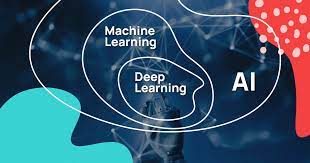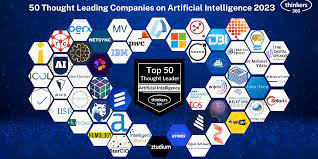Unleashing the Power of Deep Learning AI: A Journey into Intelligent Automation
Deep Learning AI: Transforming the Future
Deep learning, a subset of artificial intelligence (AI), is revolutionizing industries by enabling machines to learn from vast amounts of data. Unlike traditional programming, where explicit instructions are provided, deep learning models identify patterns and make decisions with minimal human intervention.
What is Deep Learning?
Deep learning is a type of machine learning that uses neural networks with multiple layers to process data and generate predictions. These neural networks mimic the human brain’s structure, allowing them to recognize complex patterns in images, sounds, and other data types.
The Rise of Deep Learning
The rise of deep learning can be attributed to several factors:
- Data Availability: The explosion of digital data provides a rich resource for training deep learning models.
- Advanced Algorithms: Innovations in algorithms have improved the efficiency and accuracy of deep learning models.
- Computational Power: Modern GPUs and TPUs enable faster processing speeds necessary for training large models.
Applications of Deep Learning
Deep learning has numerous applications across various fields:
Healthcare
In healthcare, deep learning algorithms assist in diagnosing diseases by analyzing medical images such as X-rays and MRIs. They also help in drug discovery by predicting molecular interactions.
Automotive Industry
The automotive industry uses deep learning for developing autonomous vehicles. These vehicles rely on neural networks to interpret sensor data and navigate safely.
NLP and Chatbots
NLP (Natural Language Processing) powered by deep learning enhances chatbots’ ability to understand and respond naturally to human language, improving customer service interactions.
The Future of Deep Learning AI
The future holds immense potential for deep learning AI. As technology advances, we can expect even more sophisticated applications that will further integrate AI into daily life. Ethical considerations will remain crucial as we navigate this transformative technological landscape.
With its ability to process complex datasets and deliver actionable insights, deep learning continues to be at the forefront of innovation in artificial intelligence. It promises not only to enhance existing systems but also to create new possibilities that were previously unimaginable.
Understanding Deep Learning AI: Key Questions and Insights for Businesses
- What is deep learning AI?
- How does deep learning differ from traditional machine learning?
- What are the applications of deep learning AI?
- What are the key challenges in implementing deep learning models?
- How can businesses leverage deep learning AI for competitive advantage?
What is deep learning AI?
Deep learning AI, a prominent aspect of artificial intelligence, refers to a sophisticated subset of machine learning techniques that employ neural networks with multiple layers to analyze and interpret vast amounts of data. Unlike traditional algorithms that rely on explicit instructions, deep learning models can autonomously identify intricate patterns and make informed decisions based on the information they process. This advanced technology has significantly impacted various industries by enabling machines to learn and adapt from complex datasets, leading to enhanced performance in tasks such as image recognition, natural language processing, and autonomous driving.
How does deep learning differ from traditional machine learning?
Deep learning differs from traditional machine learning in its approach to data processing and decision-making. While traditional machine learning algorithms require explicit feature extraction and selection by human experts, deep learning models automatically learn relevant features from the raw data through multiple layers of neural networks. This ability to extract intricate patterns and relationships within complex datasets sets deep learning apart, enabling it to handle unstructured data such as images, audio, and text more effectively. Additionally, deep learning models typically require larger amounts of data for training but can achieve higher levels of accuracy and performance in tasks like image recognition, natural language processing, and speech synthesis.
What are the applications of deep learning AI?
Deep learning AI has a wide range of applications across various industries due to its ability to process and analyze large amounts of data with high accuracy. In healthcare, it assists in diagnosing diseases by interpreting medical images such as X-rays and MRIs, and it plays a role in drug discovery by predicting molecular interactions. In the automotive industry, deep learning is crucial for developing autonomous vehicles, enabling them to interpret sensor data and navigate environments safely. Additionally, in the field of natural language processing (NLP), deep learning enhances chatbots and virtual assistants by allowing them to understand and respond more naturally to human language, improving customer service experiences. Other applications include facial recognition systems, financial market analysis, recommendation engines for e-commerce platforms, and even art generation. The versatility and efficiency of deep learning AI continue to drive innovation across these diverse sectors.
What are the key challenges in implementing deep learning models?
Implementing deep learning models poses several key challenges that practitioners often encounter. One of the primary hurdles is the requirement for large amounts of high-quality data to train these models effectively. Data preprocessing and cleaning are crucial steps in ensuring the accuracy and reliability of deep learning algorithms. Additionally, selecting the right architecture and hyperparameters for the model can be complex and time-consuming, requiring expertise and experimentation. Another challenge lies in interpreting and explaining the decisions made by deep learning models, especially in sensitive domains like healthcare or finance where transparency is essential. Overcoming these challenges demands a combination of technical skills, domain knowledge, and a thorough understanding of the underlying principles of deep learning.
How can businesses leverage deep learning AI for competitive advantage?
Businesses can leverage deep learning AI to gain a competitive advantage by harnessing its ability to analyze large volumes of data and uncover insights that drive strategic decision-making. By implementing deep learning models, companies can optimize operations, enhance customer experiences, and develop innovative products. For instance, in retail, businesses can use AI to personalize marketing campaigns based on consumer behavior analysis, leading to increased customer engagement and sales. In manufacturing, predictive maintenance powered by deep learning can reduce downtime and improve efficiency. Additionally, companies can utilize AI-driven analytics for better demand forecasting and inventory management. By integrating deep learning into their processes, businesses not only improve their operational efficiency but also position themselves as leaders in their respective industries through innovation and data-driven strategies.









